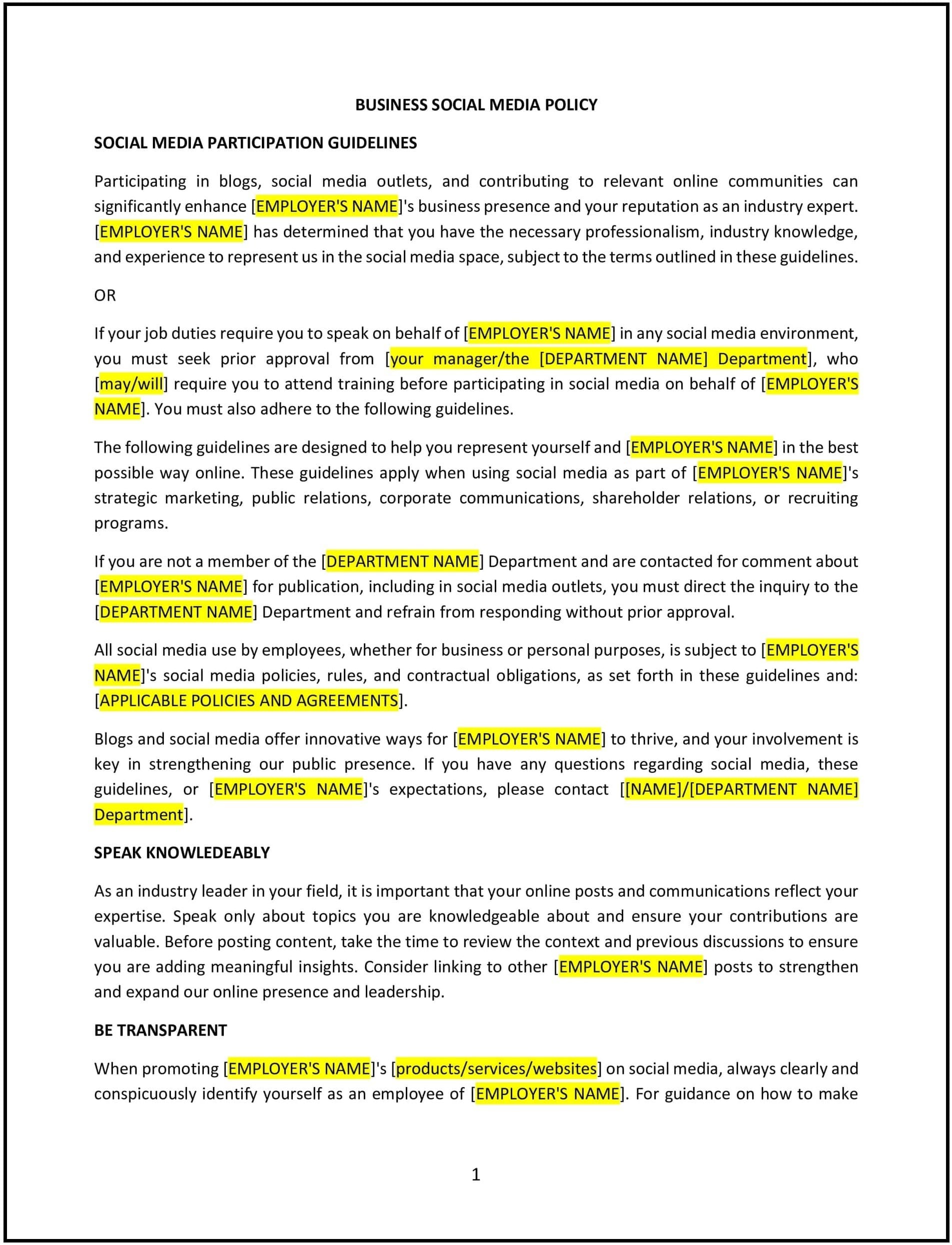Business social media policy (New Hampshire): Free template
Got contracts to review? While you're here for policies, let Cobrief make contract review effortless—start your free review now.

Customize this template for free
Business social media policy (New Hampshire)
A business social media policy helps New Hampshire businesses establish clear guidelines for the use of social media in the workplace and how employees should represent the company online. This policy outlines the appropriate use of social media for business-related purposes, including guidelines for personal use, protecting company reputation, and maintaining professional conduct.
By adopting this policy, businesses in New Hampshire can safeguard their reputation, encourage responsible social media use, and provide employees with clear expectations about online behavior, both in and outside of work hours.
How to use this business social media policy (New Hampshire)
- Define acceptable use: Clearly outline how employees should use social media in a professional capacity, including which platforms are appropriate for business communication and the type of content employees should share.
- Address personal use: Specify whether employees can use social media for personal purposes during work hours and, if so, what types of activity are allowed.
- Protect company information: Provide guidelines for employees on how to safeguard sensitive or confidential company information and avoid disclosing proprietary data online.
- Set expectations for online conduct: Establish rules regarding online behavior, ensuring employees maintain professionalism and avoid engaging in actions that could harm the company’s reputation or violate company values.
- Outline consequences for inappropriate use: Define the consequences for violating the social media policy, including warnings, disciplinary actions, or termination, depending on the severity of the breach.
- Encourage positive representation: Promote the idea of employees acting as ambassadors for the company, encouraging positive and respectful interactions on social media that align with the company’s values.
- Provide training: Offer training sessions or resources to help employees understand how to responsibly use social media in both personal and professional contexts.
- Review and update: Regularly review the policy to ensure it aligns with New Hampshire regulations, company goals, and evolving social media practices.
Benefits of using this business social media policy (New Hampshire)
This policy provides several benefits for New Hampshire businesses:
- Protects the company’s reputation: Helps businesses manage how their employees represent the company online, ensuring they align with company values and avoid damaging statements or actions.
- Reduces legal risks: By outlining acceptable social media practices, businesses can reduce the risk of legal issues such as defamation, privacy violations, or breach of confidentiality.
- Enhances employee accountability: Sets clear expectations for how employees should behave on social media, helping to maintain a professional image both internally and externally.
- Fosters a respectful workplace culture: Encourages employees to behave respectfully online, contributing to a positive and inclusive work culture that reflects the company’s values.
- Increases social media effectiveness: By providing employees with clear guidelines, businesses can use social media more effectively for marketing, communications, and customer engagement.
Tips for using this business social media policy (New Hampshire)
- Communicate the policy clearly: Ensure all employees are aware of the social media policy, including the guidelines for professional use and the consequences for violating the policy.
- Be transparent about expectations: Make sure employees understand how their behavior on social media reflects on the company, both during work hours and in their personal lives.
- Provide training and resources: Offer resources to help employees navigate the responsible use of social media and understand the impact of their online presence on the company.
- Monitor social media activity: Consider monitoring social media activity for business-related purposes, ensuring that employees comply with the company’s expectations and addressing any concerns promptly.
- Review the policy regularly: Update the policy as needed to reflect changes in New Hampshire laws, business practices, or emerging social media platforms and trends.